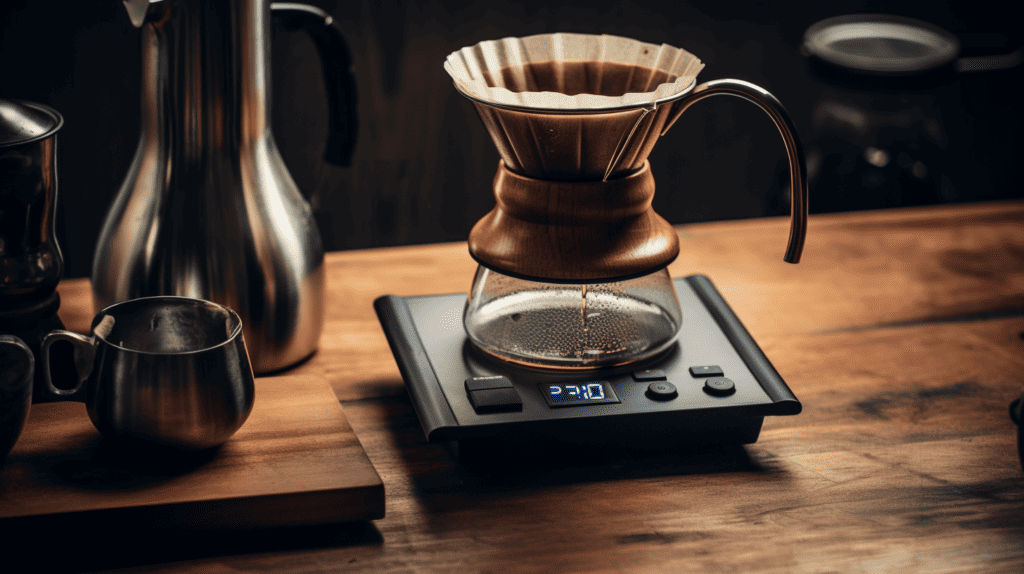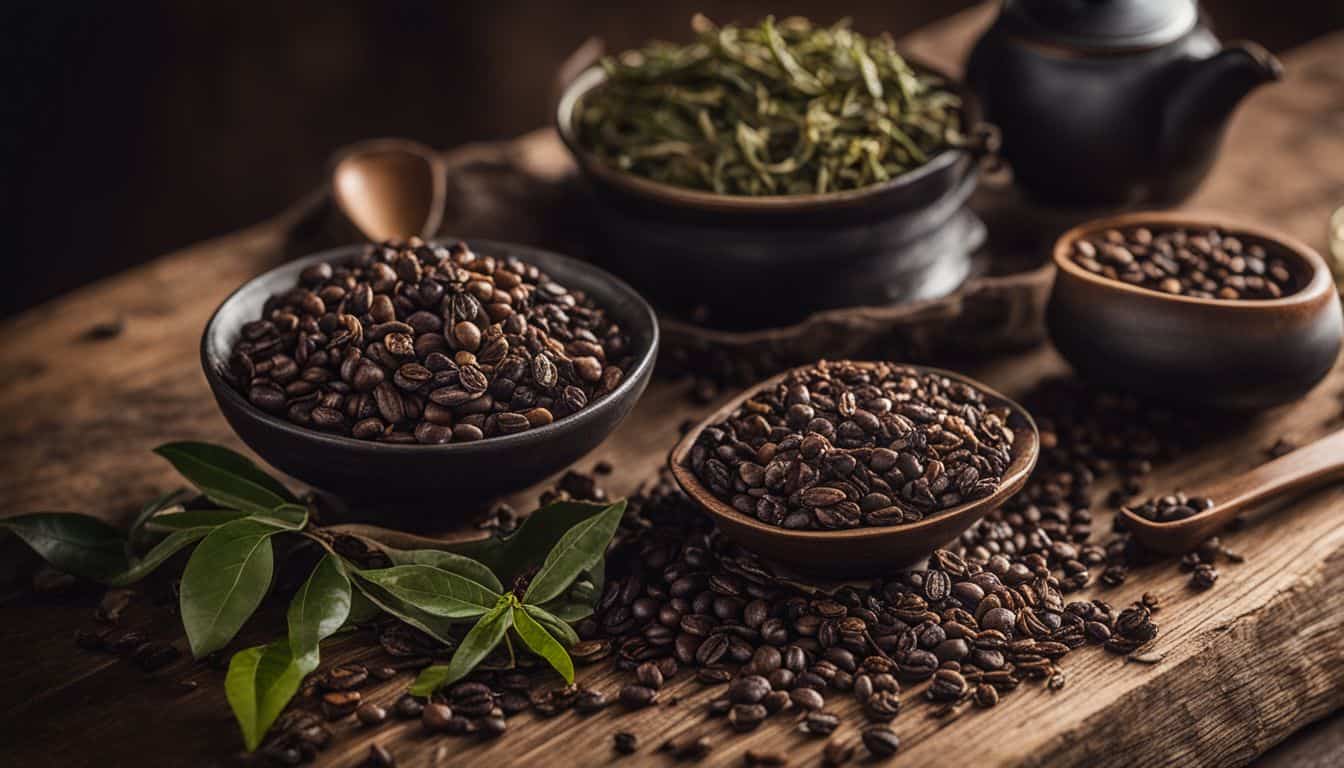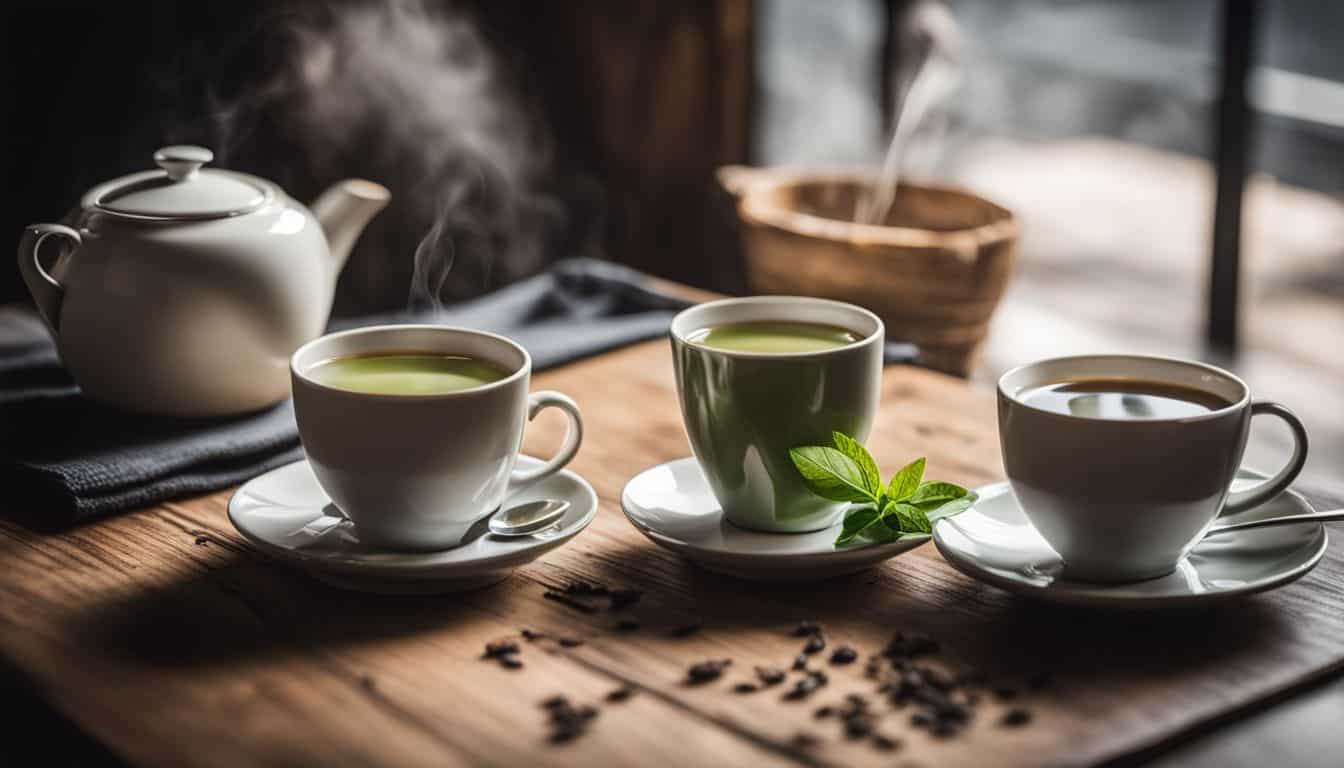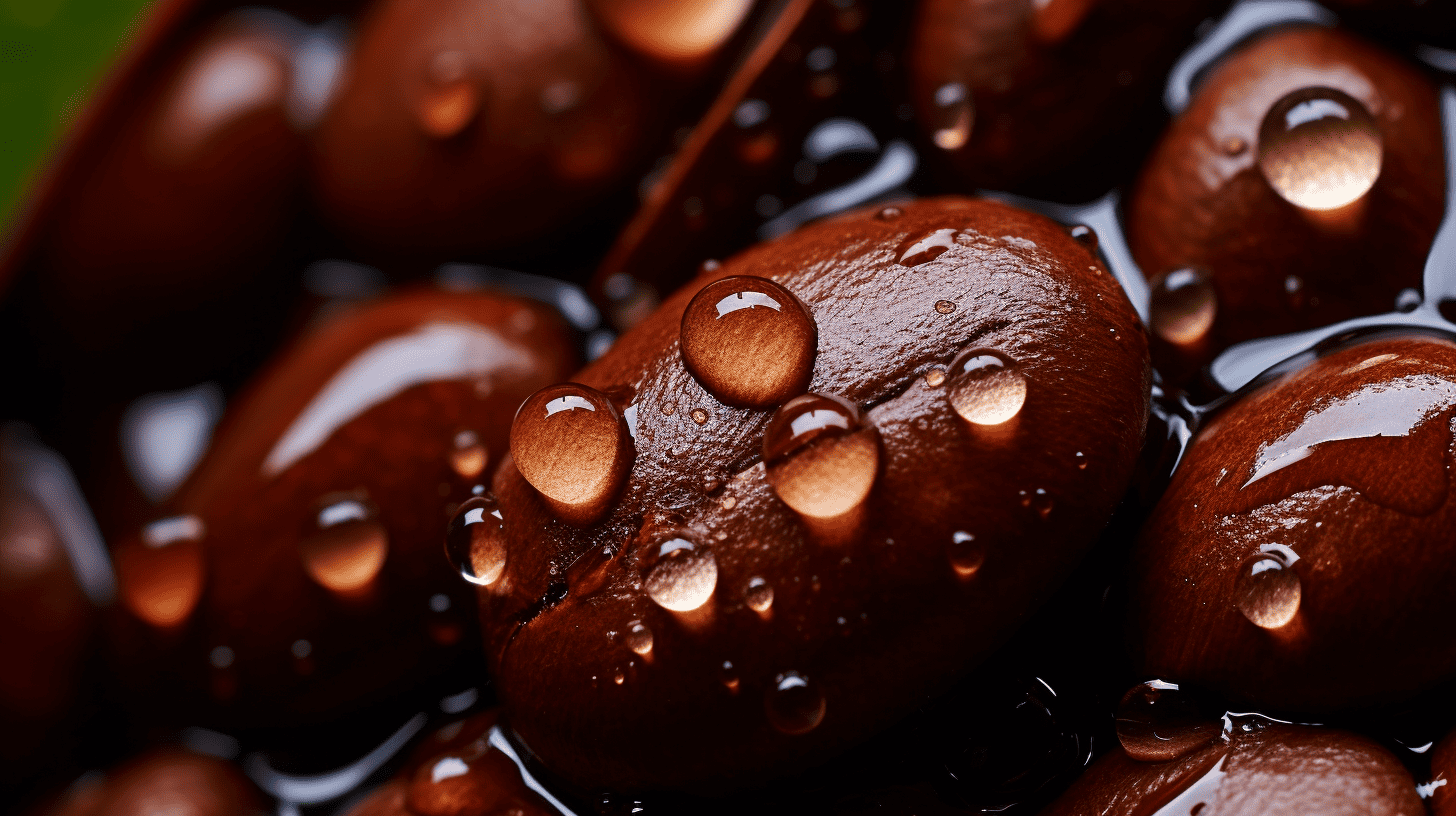Are you finding it tough to choose between black tea vs green tea vs coffee? Don’t worry; you’re not alone. I also often found myself standing indecisively in front of my pantry. This confusion encouraged me to delve into the research behind these popular beverages’ health benefits, caffeine content, and taste.
In this article, we’ll be comparing these three beverages head-to-head so that the next time you reach for your morning cuppa – be it green tea with its light flavor and low caffeine content or a strong coffee brew enriched with polyphenols – it’s an informed choice.
Ready to percolate some knowledge? Let’s dive in!
Key Takeaways
- Coffee has the highest caffeine content, black tea has a moderate amount, and green tea has the lowest amount.
- Each beverage offers various health benefits. Coffee provides an energy boost and supports weight loss. Black tea offers antioxidants for heart health and promotes digestion. Green tea also provides antioxidants, aids in weight loss, and supports brain health.
- Potential downsides include caffeine sensitivity with coffee, black tea inhibiting iron absorption, and negative effects with excessive consumption of green tea.
- The taste varies between the beverages: coffee offers different flavors and brewing methods, black tea has a bold flavor that pairs well with milk or lemon while green tea has a light and refreshing taste best enjoyed without sweeteners.
Caffeine Content Comparison
Coffee has the highest caffeine content among the three beverages, while black tea has a moderate amount and green tea contains the lowest amount of caffeine.
Coffee: highest caffeine content
Out of all drinks, coffee holds the crown for caffeine. In an 8-ounce cup, there’s a lot more of this energy giver than in the same amount of green or black tea. Its power comes from unbrewed beans with around 1.1 to 2.2% caffeine content.
This makes it great for waking you up in the morning or keeping you alert at night when you need to work late. I also find that its strong boost can help make workouts better and support weight loss plans!
Black Tea: moderate caffeine content
Black tea has a moderate amount of caffeine compared to coffee. In an 8-ounce cup of black tea, there is around 40 mg of caffeine. This means that black tea contains about half the amount of caffeine found in coffee.
If you enjoy the taste and aroma of tea but don’t want as much caffeine as you would get from coffee, black tea can be a good choice for you. It still provides a bit of an energy boost without giving you too much caffeine.
So if you’re looking for a beverage with a moderate amount of caffeine, black tea could be the perfect option for you.

Green Tea: lowest caffeine content
Green tea has the lowest caffeine content compared to black tea and coffee. A cup of brewed green tea contains only 29.4 mg of caffeine, which is much less than what you would find in a cup of coffee or black tea.
This makes green tea a great choice if you’re looking for a beverage with less caffeine. But don’t worry, even though green tea has less caffeine, it still offers many health benefits like antioxidants, heart health support, weight loss aid, energy boost, and immune system support.
So if you want something lighter and refreshing without too much caffeine, give green tea a try!
Health Benefits of Each Beverage
Coffee provides an energy boost, supports weight loss, aids in disease prevention, and enhances exercise performance. Black tea offers antioxidants for heart and brain health, promotes digestive health and weight loss, boosts energy levels, and supports the immune system.
Green tea also provides antioxidants for heart and brain health, aids in weight loss and energy boost, and supports the immune system.
Coffee: energy boost, weight loss support, disease prevention, exercise performance enhancement
Coffee provides an energy boost, supports weight loss, helps prevent diseases, and enhances exercise performance. It is a great way to start your day and stay energized throughout the day. Coffee can also aid in weight loss by boosting metabolism and suppressing appetite. The antioxidants in coffee have been linked to reducing the risk of certain diseases like Parkinson’s disease and liver cancer. Additionally, caffeine found in coffee can improve athletic performance by increasing endurance and reducing fatigue.
Black Tea: antioxidants, heart health, brain health, digestive health, weight loss, energy boost, immune system support
Black tea has numerous health benefits, making it a great choice for improving overall well-being. Here are some of the reasons why black tea is beneficial:
- Antioxidants: Black tea is rich in antioxidants, which help protect your body from damage caused by harmful free radicals.
- Heart Health: Regular consumption of black tea has been linked to a reduced risk of heart disease and stroke.
- Brain Health: The antioxidants found in black tea can improve brain function and may even lower the risk of developing neurodegenerative diseases such as Alzheimer’s and Parkinson’s.
- Digestive Health: Black tea contains compounds that can help improve digestion and alleviate digestive issues like constipation and bloating.
- Weight Loss: Drinking black tea regularly can support weight loss efforts by boosting metabolism and promoting fat oxidation.
- Energy Boost: Black tea contains caffeine, which provides a natural energy boost without the jitters often associated with coffee.
- Immune System Support: The polyphenols present in black tea have antimicrobial properties that can strengthen the immune system and help fight off infections.
Green Tea: antioxidants, heart health, brain health, weight loss, energy boost, immune system support
Green tea has many health benefits, including:
- Antioxidants: Green tea is rich in antioxidants, which help protect the body from damage caused by free radicals.
- Heart health: Consumption of green tea has been associated with a reduced risk of heart disease. It can help lower cholesterol levels and improve blood vessel function.
- Brain health: The antioxidants and caffeine in green tea may have a positive effect on brain function, improving memory, focus, and alertness.
- Weight loss: Green tea can aid in weight loss by boosting metabolism and increasing fat oxidation. It can also help reduce appetite.
- Energy boost: Green tea contains caffeine that provides a natural energy boost without the jitters or crashes associated with coffee.
- Immune system support: The catechins found in green tea have immune-boosting properties that can enhance the body’s defense against infections.
Potential Downsides and Considerations of Coffee
Coffee can cause caffeine sensitivity, increase cholesterol levels, and acidity; black tea may inhibit iron absorption; green tea has lower caffeine content but excessive consumption may lead to negative effects.
Discover more about the potential downsides and considerations of each beverage here.
Coffee: caffeine sensitivity, cholesterol increase, acidity
When it comes to coffee, there are a few potential downsides and considerations that coffee enthusiasts should be aware of:
- Caffeine sensitivity: Some individuals may be more sensitive to the effects of caffeine, experiencing symptoms like jitters, restlessness, or sleep disturbances.
- Cholesterol increase: Coffee consumption has been associated with a slight increase in cholesterol levels in some studies. However, this effect may vary depending on individual factors and overall diet.
- Acidity: Coffee is naturally acidic and can cause digestive issues for some people, such as heartburn or acid reflux.
Black Tea: inhibits iron absorption
Black tea is known to inhibit the absorption of iron in the body. This means that if you drink black tea with your meals, it can make it harder for your body to absorb the iron from the food you eat.
Iron is an important mineral that helps carry oxygen throughout your body and supports healthy blood function. So, if you have low iron levels or anemia, it’s best to avoid drinking black tea around meal times or shortly after consuming foods rich in iron.
Instead, consider having black tea between meals to minimize its impact on iron absorption.
Green Tea: lower caffeine content, potential for negative effects with excessive consumption
Green tea has a lower caffeine content compared to coffee and black tea. This means that if you’re looking for a milder stimulant, green tea might be a good choice. However, it’s important to note that excessive consumption of green tea can have negative effects. Drinking too much green tea can lead to issues like increased heart rate, headaches, and difficulty sleeping. So, while green tea can be a healthier beverage option with its lower caffeine content, it’s still important to drink it in moderation and listen to your body’s response.
Taste and Preparation Tips
When it comes to taste, coffee offers a wide range of flavors and can be brewed using various methods such as drip brewing or espresso. Black tea, on the other hand, has a bold and robust flavor that pairs well with milk or lemon.
Green tea has a light and refreshing taste that is best enjoyed without any added sweeteners. To prepare coffee, grind fresh beans and brew according to your preferred method. For black tea, steep the leaves in hot water for 3-5 minutes.
And for green tea, use water that is below boiling point (around 175°F) and steep for 2-3 minutes to avoid any bitterness.

Coffee: various flavors and brewing methods
Coffee offers a wide range of flavors and brewing methods that can enhance your coffee-drinking experience. Here are some options to explore:
- Flavored coffees: You can find a variety of flavored coffees, such as vanilla, caramel, hazelnut, and even seasonal flavors like pumpkin spice. These flavors can add a unique twist to your regular cup of joe.
- Single-origin coffees: If you’re interested in exploring the different tastes that different coffee regions have to offer, try single-origin coffees. These coffees come from specific regions or countries and have distinct flavor profiles.
- Espresso-based drinks: Espresso is the base for many popular coffee drinks like cappuccinos, lattes, and macchiatos. These drinks combine espresso with steamed milk and sometimes added flavors like chocolate or vanilla.
- Cold brew coffee: Cold brewing involves steeping coffee grounds in cold water over an extended period, usually 12 to 24 hours. This method produces a smooth and less acidic cup of coffee that is especially refreshing on hot days.
- Pour-over method: This brewing method involves pouring hot water over freshly ground coffee in a slow and controlled manner. It allows you to extract the full flavor of the beans while also giving you control over the strength of your brew.
- French press: The French press is a simple but effective way to make coffee at home. It involves steeping coarsely ground coffee in hot water for a few minutes before plunging down a filter to separate the coffee grounds from the liquid.
Green Tea: light and refreshing flavor, brewing tips
Green tea has a light and refreshing flavor that is enjoyed by many. To make the most out of your green tea experience, here are some brewing tips:
- Use fresh water: Start with clean and fresh water to brew your green tea. This will ensure a better taste.
- Optimal water temperature: Green tea is best brewed at around 175°F (80°C) to 185°F (85°C). Boiling water can make the tea taste bitter, so it’s important to let it cool slightly before brewing.
- Steeping time: Let the green tea steep for about 2-3 minutes. Steeping for too long can also lead to bitterness.
- Don’t overdo the tea leaves: Use about 1 teaspoon of loose green tea leaves or one teabag per cup of water for the perfect balance of flavor.
- Experiment with brewing methods: Green tea can be brewed using various methods such as steeping in a teapot, using a teabag, or using a stainless steel infuser. Find the method that suits your preference.
Conclusion on Black Tea Vs Green Tea Vs Coffee
When it comes to choosing between black tea, green tea, or coffee, it ultimately depends on your personal preferences and health goals. If you’re looking for a high caffeine boost, coffee is the way to go.
If you prefer a moderate amount of caffeine with added antioxidants and potential health benefits, black tea is a good choice. And if you want a lower caffeine option with similar health benefits as black tea, green tea might be the best fit for you.
Ultimately, each beverage has its own unique taste and benefits, so experiment and find what works best for you!
What Are the Health Benefits and Risks of Coffee Compared to Tea?
When comparing tea vs coffee health benefits risks, both beverages offer advantages. Coffee is a popular choice due to its ability to increase alertness and boost energy levels. It may also protect against Parkinson’s disease and certain cancers. However, excessive consumption can lead to agitation, restlessness, and disrupted sleep. Tea, on the other hand, contains antioxidants that protect against chronic conditions, such as heart disease and cancer. Nevertheless, excessive tea intake may cause digestive issues and hinder nutrient absorption. Moderation is key for reaping the health benefits of both tea and coffee.
FAQs on Black Tea Vs Green Tea Vs Coffee
1. Is black tea healthier than green tea and coffee?
Black tea, green tea, and coffee all have their own health benefits, so it’s not accurate to say that one is inherently healthier than the others. It depends on individual preferences and needs.
2. Which has more caffeine: black tea, green tea, or coffee?
Coffee generally has more caffeine content compared to both black tea and green tea. However, the exact amount can vary depending on factors like brewing method and serving size.
3. Do black tea, green tea, and coffee offer any antioxidant benefits?
Yes, all three beverages contain antioxidants that can help protect the body against free radicals. However, the types of antioxidants may differ between them.
4. Can drinking too much black tea, green tea or coffee be harmful?
Consuming excessive amounts of any beverage can have negative effects on health due to their caffeine content or other compounds present in them. It’s important to consume these drinks in moderation as part of a balanced diet for optimal health.





Leave a Reply